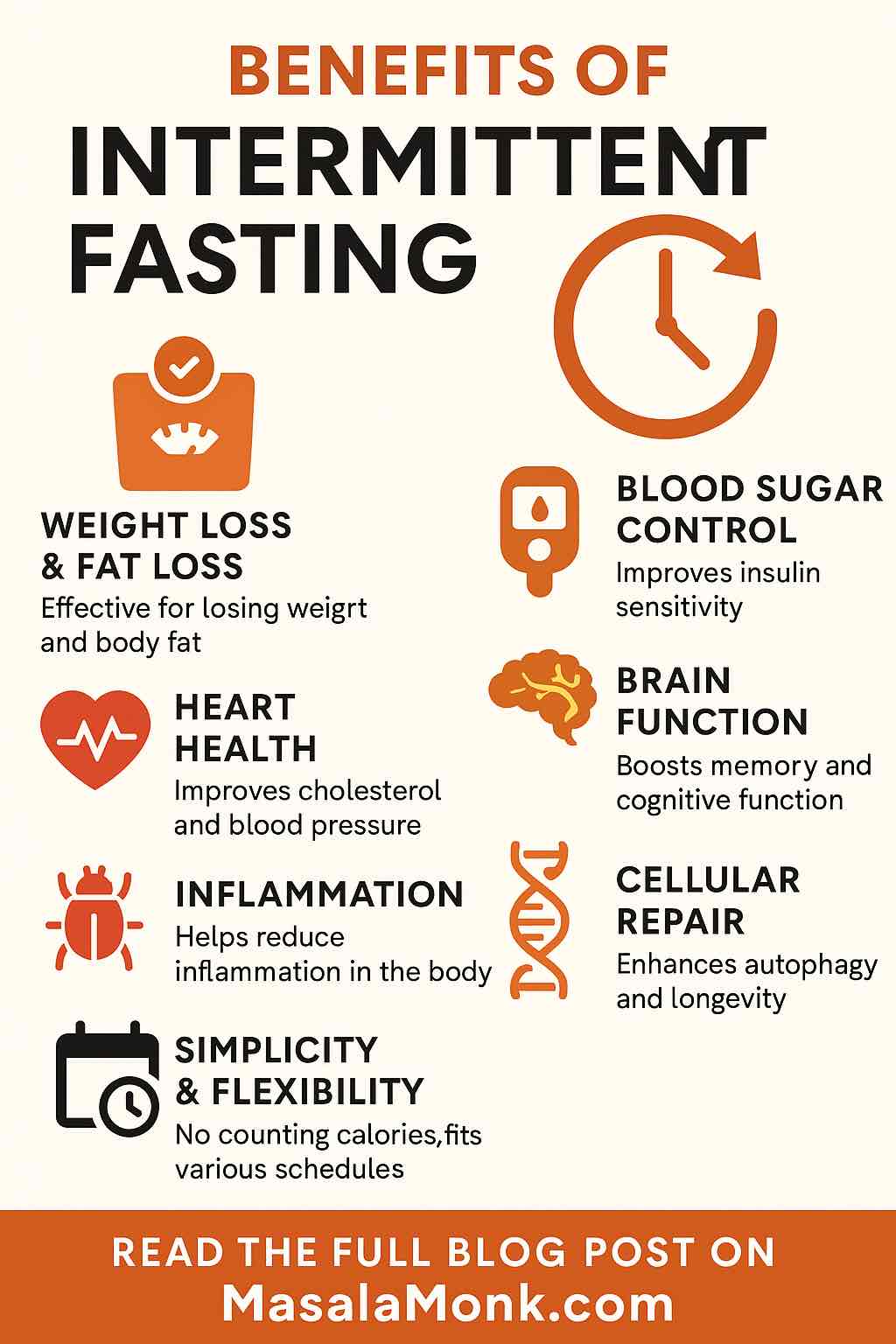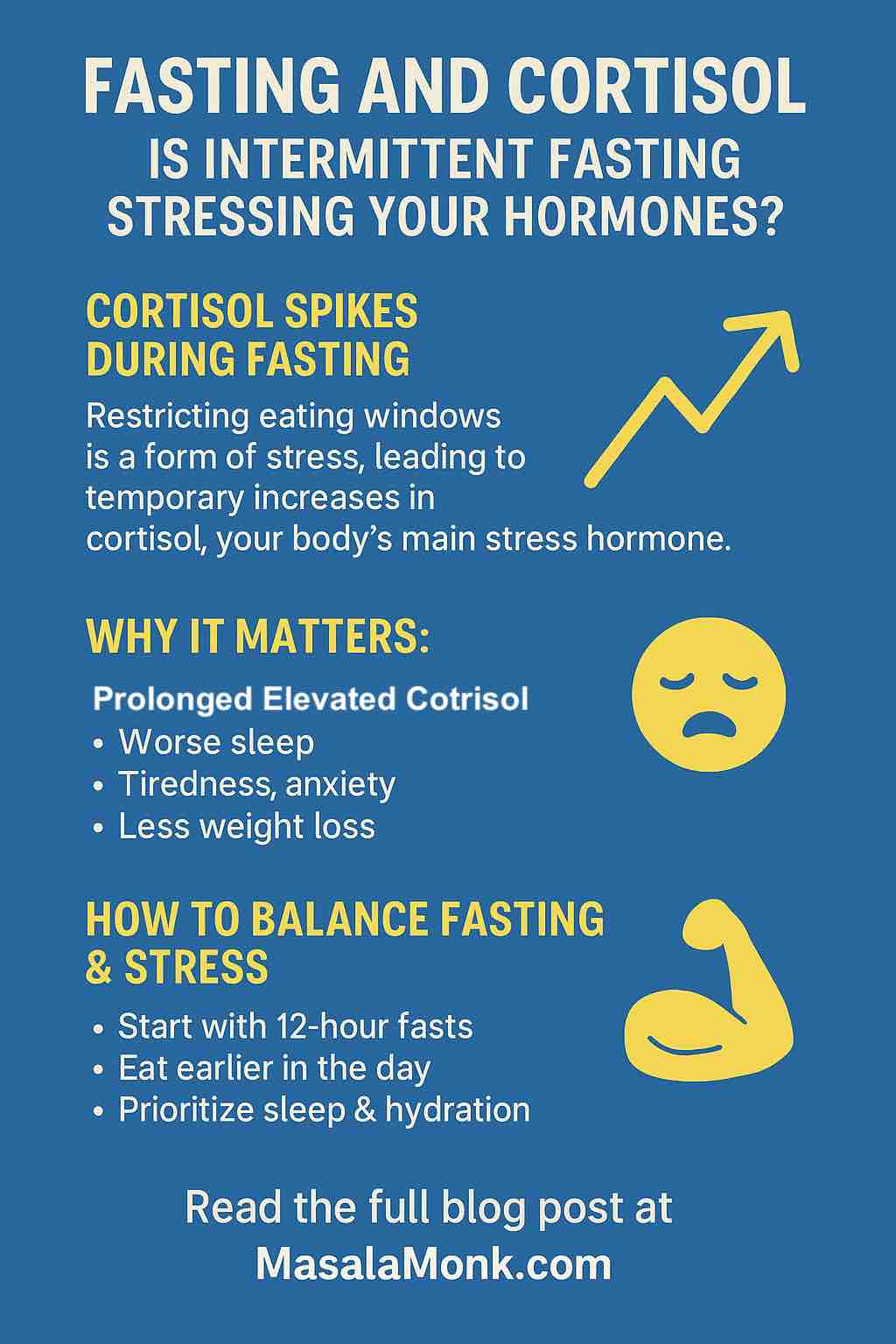
Intermittent fasting (IF) isn’t just a diet trend—it’s a revolution in how we think about eating, health, and even longevity. But behind the headlines and celebrity endorsements, what does the science actually say? Can skipping meals really help you lose weight, prevent diabetes, or even slow aging? What’s the best way to do IF for your lifestyle—and is it right for everyone?
Whether you’re IF-curious, a seasoned faster, or just want real answers, this post will cut through the noise with evidence-based benefits, risks, and practical tips for success.
What is Intermittent Fasting?
Intermittent fasting is not a diet—it’s an eating pattern. You cycle between periods of eating and fasting, with no strict rules about what you eat, but rather when you eat.
Popular IF Methods:
- 16:8: Fast for 16 hours, eat in an 8-hour window daily.
- 5:2: Eat normally for 5 days, restrict calories (500–600) for 2 non-consecutive days.
- 4:3: Eat 4 days, fast or restrict 3 days per week.
- Alternate-Day Fasting (ADF): Alternate fasting and regular eating every other day.
- OMAD: “One Meal A Day” fasting for 23 hours, one big meal.
Why is IF different from traditional dieting?
It focuses on when you eat, not just calories. Yet, research shows that total calorie intake still matters—IF is a framework to make calorie reduction easier and more sustainable.
1. Weight Loss and Fat Loss: The Evidence
If you’re after sustainable weight loss, the evidence for IF is solid:
- A 2025 Harvard meta-analysis (99 trials, 6,500+ participants) found IF to be as effective as standard calorie counting for weight loss, but alternate-day fasting (ADF) led to slightly more weight lost (~1.3 kg more), and also improved cholesterol, triglycerides, and inflammation .
- The “4:3” method outperformed classic calorie restriction for weight loss in a year-long University of Colorado study (7.6% lost vs. 5%), likely due to better adherence—people just found it easier to stick to .
- Fat loss, not muscle loss: IF, especially when paired with exercise, targets body fat while sparing lean muscle .
Why does it work?
During fasting, insulin drops, fat-burning ramps up, and human growth hormone increases—making it easier to tap into fat stores.
2. Blood Sugar, Insulin, and Diabetes
- Improved insulin sensitivity: IF has consistently shown to lower fasting insulin, reduce blood sugar, and enhance insulin sensitivity—even in people with prediabetes and Type 2 diabetes .
- 5:2 diet leads the pack: In a recent RCT (2021–2024), people with Type 2 diabetes on a 5:2 plan saw better fasting glucose, triglycerides, and insulin sensitivity than those on daily restriction or 10-hour eating windows .
- Caution: If you’re on blood sugar meds or insulin, always consult your doctor before trying IF!
3. Heart and Metabolic Health
- Better heart markers: IF reliably reduces blood pressure, LDL (bad) cholesterol, triglycerides, and markers of inflammation like CRP .
- Long-term benefits? While short-term studies are promising, some experts caution that the advantages may be similar to simply eating fewer calories. For heart patients, when you eat may matter too—some studies suggest longer eating windows might benefit certain heart conditions .
4. Cellular Repair, Autophagy, and Longevity
Here’s where IF gets really interesting:
- Cellular cleanup: Fasting switches the body into repair mode—cells remove waste (autophagy), DNA gets repaired, and longevity genes (like sirtuins) are activated .
- Animal studies: In mice and monkeys, IF extends lifespan and delays age-related diseases.
- Humans: The “fasting-mimicking diet” (a modified IF) has shown reductions in biological age (~2.5 years younger!) and improvements in metabolism and immune function .
The real magic of autophagy kicks in after ~36–72 hours of fasting, but long fasts should only be done under medical supervision .
5. Brain and Gut Health
- Brain boost: IF increases brain-derived neurotrophic factor (BDNF), enhances learning, memory, and may protect against neurodegenerative diseases like Alzheimer’s and Parkinson’s .
- Mood & focus: Many fasters report increased clarity and energy—some studies confirm improved mood and cognitive performance.
- Gut repair: IF can restore the gut lining, improve the microbiome, and reduce “leaky gut” in animal studies .
6. Inflammation and Immune System
- IF lowers levels of inflammatory cytokines (like IL-6, TNF-alpha, CRP), and even rejuvenates immune cell production in some fasting-mimicking diet trials .
7. Practical Benefits: Simplicity, Adherence, and Lifestyle
- No calorie counting: IF is simpler than traditional diets—just follow the clock.
- Easier to stick to: Studies show adherence rates are higher for IF than daily restriction, possibly due to reduced decision fatigue and more flexible eating on “feast” days .
- Works with most lifestyles: You can adjust fasting windows to fit shift work, social life, or cultural eating patterns.
Potential Risks and Who Should Avoid IF
Intermittent fasting isn’t a magic bullet—and it’s not for everyone.
Not recommended for:
- Pregnant or breastfeeding women
- Children and teenagers
- Anyone with a history of eating disorders
- Frail elderly or underweight individuals
- People with certain chronic conditions—always consult your doctor first
Possible side effects (usually fade in weeks):
Hunger, headaches, low energy, irritability, sleep disturbances, bad breath.
Special caution:
Some evidence (still debated) suggests that strict IF (especially 8-hour eating windows) might increase long-term cardiovascular mortality in certain groups. Balance is key; more research is needed .
How to Start Intermittent Fasting: A Practical Guide
1. Pick a method that fits your lifestyle
- New to IF? Start with 12:12 (12 hours fasting overnight) or 14:10 and work up.
- Prefer fewer fasts, but longer? Try 5:2 or 4:3.
- Social life matters? Use fasting windows that skip breakfast or dinner based on your schedule.
2. Ease in gradually
- Start with shorter fasts and increase fasting duration weekly.
- Stay hydrated—water, black coffee, and tea are your friends.
3. Prioritize protein and whole foods
- To minimize muscle loss, eat plenty of protein and vegetables when you do eat.
- Pair IF with resistance exercise for best results .
4. Listen to your body
- Adjust fasting windows if you feel lightheaded, overly fatigued, or unwell.
- IF is flexible: skip a fast for big events, holidays, or when you need extra energy.
5. Track your progress
- Measure weight, waist circumference, blood sugar, or energy levels—not just pounds lost.
- Take “before and after” photos or keep a journal to stay motivated.
6. Get medical support if needed
- If you have any medical condition, or plan prolonged (24–72hr) fasts, work with your doctor or a dietitian.
The Bottom Line: Should You Try Intermittent Fasting?
Intermittent fasting offers more than just weight loss—it’s a powerful tool for metabolic health, cellular repair, brain function, and maybe even longevity. It’s flexible, practical, and can fit most lifestyles. But it’s not a magic fix: the quality of your diet, exercise, sleep, and stress management still matter. And it’s not for everyone.
If you’re interested, start slow, listen to your body, and aim for consistency over perfection. Pair IF with healthy habits, and you might be surprised at the benefits—not just on your waistline, but for your overall health.
References
- Harvard T.H. Chan School of Public Health. “Intermittent fasting may be effective for weight loss, cardiometabolic health.” (2025)
- The Times. “Intermittent fasting more effective than calorie counting for weight loss, study finds.” (2025)
- University of Mississippi meta-analysis on IF and muscle mass. (2025)
- Frontiers in Nutrition. “Intermittent Fasting: Mechanisms and Clinical Use.” (2025)
- Science Daily. “Intermittent energy restriction and diabetes: Latest RCT.” (2025)
- Washington Post. “Intermittent fasting for weight loss: New findings and long-term safety.” (2025)
- Nature. “The role of fasting-induced autophagy in health and disease.” (2024)
- USC Leonard Davis School. “Fasting-mimicking diet reduces biological age.” (2024)
- NY Post. “Extreme intermittent fasting: When does autophagy start?” (2025)
- Arxiv preprint. “Intermittent fasting and the brain.” (2024)
- NAD News. “Intermittent fasting and gut aging: New research.” (2025)
Ready to try intermittent fasting?
Share your thoughts or questions in the comments—and let’s learn from each other’s experience!
Frequently Asked Questions (FAQs)
1. What is the best intermittent fasting method for beginners?
Answer:
The 16:8 method is widely recommended for beginners: fast for 16 hours (including overnight), and eat within an 8-hour window. It’s simple to start, flexible, and fits most lifestyles.
2. Will intermittent fasting slow my metabolism?
Answer:
No, studies show that short-term intermittent fasting may actually boost metabolism slightly. Metabolic slowdown is only a risk with extreme, prolonged calorie restriction over months, not with standard IF protocols.
3. Can I drink coffee or tea during fasting?
Answer:
Yes! Black coffee, unsweetened tea, and water are all allowed during fasting periods. Avoid sugar, milk, and cream, as these can break your fast.
4. How long does it take to see results with intermittent fasting?
Answer:
Many people notice changes in hunger, energy, and even some weight loss within the first 2–4 weeks. For more significant weight or health improvements, give it at least 8–12 weeks and track your progress.
5. Will I lose muscle with intermittent fasting?
Answer:
Not if you eat enough protein and incorporate resistance training. IF paired with strength training can preserve, or even increase, lean muscle while reducing body fat.
6. Is intermittent fasting safe for women?
Answer:
Most women can safely practice IF, but some may experience changes in menstrual cycles or hormone balance. Pregnant, breastfeeding women, or those with a history of eating disorders should avoid IF unless supervised by a doctor.
7. Can I exercise while fasting?
Answer:
Yes! Light to moderate exercise is safe for most people during a fast. Many report better fat burning. Listen to your body, and schedule more intense workouts during your eating window if needed.
8. What should I eat during my eating window?
Answer:
Focus on whole, nutrient-dense foods: lean protein, healthy fats, whole grains, fruits, and plenty of vegetables. Avoid binging on junk food during eating windows—quality still matters.
9. Are there any side effects of intermittent fasting?
Answer:
Common side effects at the start include hunger, headaches, irritability, and fatigue. These usually subside after 1–2 weeks as your body adapts. Staying hydrated and getting enough electrolytes can help.
10. Who should not try intermittent fasting?
Answer:
IF is not recommended for children, pregnant or breastfeeding women, people with a history of eating disorders, the frail elderly, or anyone with certain chronic medical conditions (like advanced diabetes on insulin) unless supervised by a healthcare professional.










